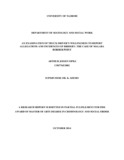| dc.description.abstract | The general objective of the study was to examine truck driver’s willingness to report allegations
and incidences of bribery at Malaba border point. In order to achieve this, the study looked at
the nature of the cases being reported and the level and trend of truck driver’s willingness to
report allegations and incidences of bribery. Factors which influence truck drivers from reporting
allegations and incidences of bribery and strategies which encourage truck drivers to report
allegations and incidences of bribery were also looked into. The study utilizedthe Social
Learning Theory. Questionnaires and interview guides were used to collect data from 100 truck
drivers and the 6 key informants respectively. The collected quantitative data was analyzed using
SPSS package and the results presented as percentages and frequency distributions.
It was found that the prevalence of bribery was high at Malaba border point due to being a busy
transit point offering many opportunities for bribery demands. The lowest and highest amounts
of bribes that were given at the border ranged between Kshs. 200-500 and between Kshs. 2005,000
respectively. It was found that most of the respondents were unwilling to report bribery
demands due to the fear of victimization while the level of willingness to report allegations and
incidences of bribery had remained the same over time. Most individuals did not report bribery
because they regarded it as not their responsibility and also did not report because they believed
that no action was going to be taken.
It was also found that the preferred places to report allegations and incidences of bribery was
EACC due to its autonomy and clear mandate while KRA, Kenya Police and the provincial
administration were considered as perpetrators of bribery offences. The truck driver’s attitude
towards corruption was negative as evidenced by disagreement on statements that linkedleaders
and government to corruption. The study recommends that government and EACC should create
awareness on efficient reporting channels and protect whistle-blowers from victimization. Other
studies targeting other border points in the country should be undertaken in order to inform on
truck driver’s willingness to report allegations and incidences of bribery. | en_US |

